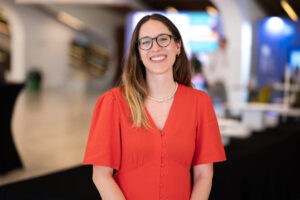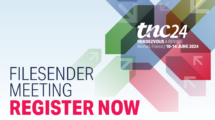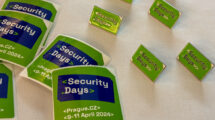Paul Dekkers is a wireless services specialist at SURF working on the innovation and operation of a variety of services, and his main area is international eduroam. Paul is a member of the eduroam Operational and Development Team and is currently the chair of the Global eduroam Governance Committee (GeGC) which coordinates eduroam globally. He is also eduroam Service Owner in the GÉANT Project. Paul is and involved in OpenRoaming. At SURF, Paul is also responsible for national services such as eduroam visitor access, geteduroam, and for the development of IoT related services such as LoRaWAN and iotroam and has worked on the development and support of govroam. Previously he worked on 3G and 4G networking as well as scalable, secure and cloud infrastructures.
Paul received the Community Award 2022 during the award ceremony held in Trieste, Italy, at TNC22. We interviewed him to get to know his role in and dedication to the GÉANT Community.
As you said at the Award Ceremony, Paul, it all started twenty years ago at SURF. After all this time, what does eduroam mean to you?
There is a whole range of emotions attached to eduroam. It is such a big part of my career and, twenty years ago, I would have never imagined it would still have been my job now. Back then, Wi-Fi was relatively new, but we started something that the rest of the world still looks up to – other roaming initiatives are inspired by how we structured eduroam. It is still interesting and challenging working on eduroam because it is still relevant nowadays. However, my work is also changing, and every day is different. I recently picked up a new role, some people come and go, and the community we work in is very open and collaborative. For me, that is enough to remain interested and motivated. It’s important to realise that we are used to the community being open, we don’t have a hidden agenda, we work for the benefit of the community but that is not always the case in the outside world! And I treasure that.
In your own words, how would you say that eduroam has been contributing to a more sustainable R&E community?
eduroam has existed for some time now because it is future proof. The foundation that we started has been a stable factor in the community for the past two decades and is still relevant today. The eduroam team is involved in all kinds of standardization models, it monitors how the eduroam blueprint is affected and, thanks to this, we can make sure it stays relevant.
We tested the technologies that underpin open roaming in 2005. After a couple of years, the industry picked up to work with the same technologies. With eduroam, we can embrace open roaming and leverage its benefits, while remaining our own entity. I think the future is bright for eduroam, it has been a stable federation in our community with solid standard and blueprint and will continue to remain so along side all the improvements to increase its benefits. On the other side, we are constantly growing. Within the GN4-3N project, there has been an increase in the eduroam community. An example of this is that, in the emerging regions, eduroam it is picked up as one of the first NREN services. I think this speaks for itself!
Can you share with us your favourite moment working on eduroam with our community?
Probably one of my favourite activities was training institutions on how to work with eduroam. It meant travelling around the world – I remember going to Turkey, South Africa, and Zambia. It was nice to see the value that eduroam brings to others in the world and feeling the enthusiasm from all these people. This is what I like about eduroam, that it is a service that makes people happy because it gets them connected and it is a brand that people recognise. Receiving the Community Award was a high point in my career and I am happy that my work was recognised.
What else have you been working on at SURF?
I work on mobile technologies, so other technologies besides Wi-Fi like Internet of Things (iOt) and LoRaWAN. We have now started a new initiative on the IoT, and I also worked on clouds and security. But these come and go in my career, eduroam is my main focus. Although security is part of eduroam as we need do not only need to make it easy to access the service but also secure.
Where do you see our community going in the new few years and what contribution do you think eduroam will make to achieving that?
eduroam is here to stay. I see it expanding to new regions and I also see a big opportunity in being able to work together and benefitting from the ability to roam with other open roaming initiatives. We may even have the ability to roam with different roaming technologies in the future, like 5G, but I think that the way we use eduroam now will still be relevant in the coming years. Our work is also focused on making it easier for students and institutions to connect to eduroam and for support desks to facilitate the onboarding of eduroam and other federations at the same time. We don’t know where the industry is going when it comes to mobile devices, but so as far I see it we are working together with the same standards.
Submissions for nominations to the Community Award 2023 will open in January. Check the GÉANT Community Programme website to stay updated.







